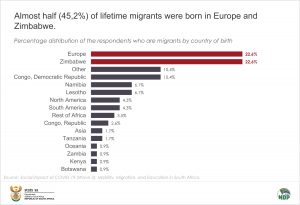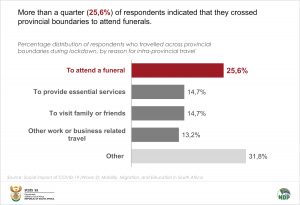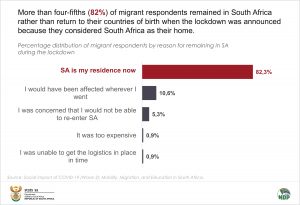Mobility and migration in SA during the COVID-19 lockdown
Statistics South Africa (Stats SA) has released the third and final round of a series of three online web-based surveys to measure the impact of the COVID-19 pandemic on individuals in the country. The third round of the survey (Wave 3) focused on migration and education issues for persons residing in South Africa who are 18 years and older.
Data collection for Wave 3 occurred during level 3 of the national lockdown between 17 June and 4 July 2020. The survey used a non-probability, convenience sample and received responses from 1 323 individuals, roughly half coming from persons living in Gauteng. While the survey results are not representative of the entire South African population, they are indicative of the types of challenges facing South Africans during the global pandemic.
According to the survey, Social impact of COVID-19 (Wave 3): Mobility, Migration, and Education in South Africa, nearly six per cent of respondents changed their provincial residence during the national lockdown. Of these respondents, the highest proportion moved during the few days between the announcement of the lockdown and the start of the lockdown. The reason for move: about one-quarter of respondents indicated that they wanted to be closer to their family or friends.
Findings on inter-provincial travel shows that approximately 12% of respondents indicated that they travelled across provincial boundaries since the start of the national lockdown. More than a quarter of these respondents indicated that they crossed provincial boundaries to attend funerals, while about 15% of respondents travelled to provide essential services, and approximately 13% travelled for non-essential work or business related travel. About 15% of respondents travelled to visit family or friends.
With regard to international migration, data showed that about 90% of the respondents in the sample indicated that they were born in South Africa (non-migrants), whilst about nine per cent were international migrants (respondents who indicated that they were born outside of South Africa).
Data pertaining to foreign-born respondents’ countries of birth shows that almost half of lifetime migrants were born in Zimbabwe (22,6%) and Europe (22,6%). One-third of respondents were born in countries that are part of the Southern African Development Community (SADC) region. Other areas featured were South America, North America, the rest of Africa (outside the SADC region) and Asia.

More than four-fifths (82%) of migrant respondents remained in South Africa rather than return to their countries of birth when the lockdown was announced because they considered South Africa as their home, while 11% felt that the COVID-19 pandemic was global and that they would still be at risk regardless of whether they moved. Five per cent of migrant respondents indicated that they were concerned that if they left South Africa they would be unable to re-enter South Africa.
According to the survey, more than twenty per cent of migrant respondents indicated that they did not send remittances during lockdown because they could not afford to send money.
The results show that, generally, migrant respondents were more vulnerable than non-migrant respondents. A much higher percentage of migrant respondents (22,5%) were unemployed as compared to non-migrants (9%). Findings from the report emphasises the important role of mobility and migration on the South African economy during the national lockdown.
The survey aimed to provide information that could be used by government and other service providers to better understand the impact of the pandemic on migration and education, and to devise interventions to assist the population.
If you missed the link in the article, download the full report here.



